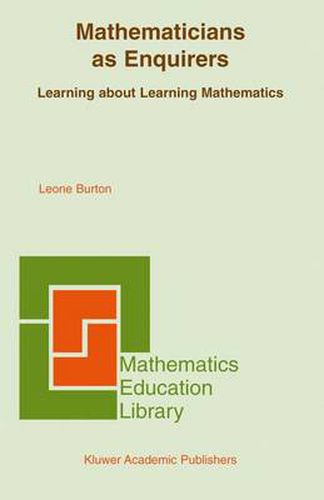Readings Newsletter
Become a Readings Member to make your shopping experience even easier.
Sign in or sign up for free!
You’re not far away from qualifying for FREE standard shipping within Australia
You’ve qualified for FREE standard shipping within Australia
The cart is loading…






This title is printed to order. This book may have been self-published. If so, we cannot guarantee the quality of the content. In the main most books will have gone through the editing process however some may not. We therefore suggest that you be aware of this before ordering this book. If in doubt check either the author or publisher’s details as we are unable to accept any returns unless they are faulty. Please contact us if you have any questions.
This volume reports on an empirical study with 70 research mathematicians, 35 females and 35 males. The purpose of the study was to explore how these mathematicians came to know mathematics and to match their descriptions against a theoretical model of coming to know mathematics derived from the literature of the history, philosophy and sociology of science and mathematics. The assumption underlying the research was that, when researching, mathematicians are learning and, consequently, their experiences are valid for less sophisticated learners in classrooms. The study provided major surprises particularly with respect to the mathematical thinking of the mathematicians and to the ways in which they organised their practices. It also contradicted long-standing stereotypes. This book applies the learning from the study to learning and teaching mathematics. It offers a rationale, based on the practices of research mathematicians, to support and encourage recent school-based developments in the learning of mathematics through enquiry. The book will be of interest to mathematicians, mathematics educators, teacher educators (mathematics), and higher degree students of mathematics educati
$9.00 standard shipping within Australia
FREE standard shipping within Australia for orders over $100.00
Express & International shipping calculated at checkout
This title is printed to order. This book may have been self-published. If so, we cannot guarantee the quality of the content. In the main most books will have gone through the editing process however some may not. We therefore suggest that you be aware of this before ordering this book. If in doubt check either the author or publisher’s details as we are unable to accept any returns unless they are faulty. Please contact us if you have any questions.
This volume reports on an empirical study with 70 research mathematicians, 35 females and 35 males. The purpose of the study was to explore how these mathematicians came to know mathematics and to match their descriptions against a theoretical model of coming to know mathematics derived from the literature of the history, philosophy and sociology of science and mathematics. The assumption underlying the research was that, when researching, mathematicians are learning and, consequently, their experiences are valid for less sophisticated learners in classrooms. The study provided major surprises particularly with respect to the mathematical thinking of the mathematicians and to the ways in which they organised their practices. It also contradicted long-standing stereotypes. This book applies the learning from the study to learning and teaching mathematics. It offers a rationale, based on the practices of research mathematicians, to support and encourage recent school-based developments in the learning of mathematics through enquiry. The book will be of interest to mathematicians, mathematics educators, teacher educators (mathematics), and higher degree students of mathematics educati